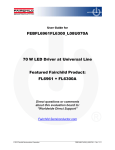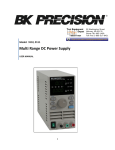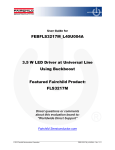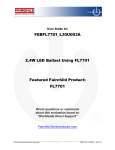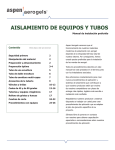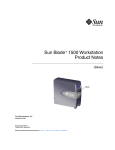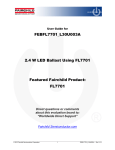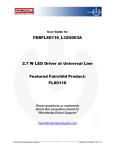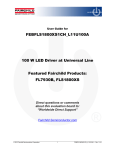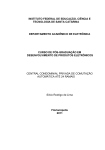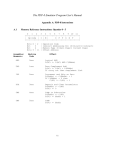Download User Guide for FEBFL6961_L10U030A
Transcript
User Guide for FEBFL6961_L10U030A 30 W LED Driver at Universal Line Featured Fairchild Product: FL6961 Direct questions or comments about this evaluation board to: “Worldwide Direct Support” Fairchild Semiconductor.com © 2012 Fairchild Semiconductor Corporation 1 FEBFL6961_L10U030A • Rev. 1.0.2 Table of Contents 1. Introduction ............................................................................................................................... 3 1.1. General Description of FL6961 ....................................................................................... 3 1.2. Features of FL6961 .......................................................................................................... 3 1.3. Block Diagram ................................................................................................................. 4 2. Specifications for Evaluation Board ......................................................................................... 5 3. Photographs............................................................................................................................... 6 4. Printed Circuit Board ................................................................................................................ 7 5. Schematic .................................................................................................................................. 8 6. Bill of Materials ........................................................................................................................ 9 7. Transformer Design ................................................................................................................ 11 8. Performance of Evaluation Board ........................................................................................... 12 8.1. Electrical Efficiency....................................................................................................... 13 8.2. Power Factor (PF) .......................................................................................................... 14 8.3. Total Harmonic Distortion (THD) ................................................................................. 15 8.4. Constant Current (CC) & Constant Voltage (CV) ......................................................... 17 8.5. Operating Temperature .................................................................................................. 19 8.6. Startup Time................................................................................................................... 20 8.7. Operation Waveforms .................................................................................................... 22 8.8. Short-Circuit Protection ................................................................................................. 24 8.9. Stress of the MOSFET & Rectifier ................................................................................ 25 8.10. Electromagnetic Interference (EMI) .............................................................................. 29 9. Revision History ..................................................................................................................... 30 © 2012 Fairchild Semiconductor Corporation 2 FEBFL6961_L10U030A • Rev. 1.0.2 This user guide supports the evaluation kit for the FL6961. It should be used in conjunction with the FL6961 datasheet as well as Fairchild’s application notes and technical support team. Please visit Fairchild’s website at www.fairchildsemi.com. 1. Introduction This document describes the proposed solution for a universal LED ballast using the FL6961 CRM PFC controller. The input voltage range is 90 VRMS – 265 VRMS and there is one DC output with a constant current of 1.25 A at 24 VMAX. This document contains general description of FL6961, the power supply specification, schematic, bill of materials, and the typical operating characteristics. 1.1. General Description of FL6961 The FL6961 is an active Power Factor Correction (PFC) controller for boost PFC applications that operate in Critical conduction Mode (CRM). It uses a voltage mode PWM that compares an internal ramp signal with the error amplifier output to generate the MOSFET turn-off signal. Because the voltage-mode CRM PFC controller does not need rectified AC line voltage information, it saves the power loss of the input voltagesensing network required by the current-mode CRM PFC controller. 1.2. Features of FL6961 Boundary Mode PFC Controller Low Input Current THD Controlled On-Time PWM Zero-Current Detection (ZDC) Cycle-by-Cycle Current Limiting Leading-Edge Blanking Instead of RC Filtering Low Startup Current: 10 µA (Typical) Low Operating Current: 4.5 mA (Typical) Feedback Open-Loop Protection Programmable Maximum On-Time (MOT) Output Over-Voltage Clamping Protection Clamped Gate Output Voltage: 16.5 V © 2012 Fairchild Semiconductor Corporation 3 FEBFL6961_L10U030A • Rev. 1.0.2 1.3. Block Diagram Figure 1. © 2012 Fairchild Semiconductor Corporation Internal Block Diagram of FL6961 4 FEBFL6961_L10U030A • Rev. 1.0.2 2. Specifications for Evaluation Board Table 1. Summary of Features and Performance Main Controller FL6961 Input Voltage Range 90 VAC~265 VAC Input Voltage Frequency 47 Hz~63 Hz Rated Output Power 30 W Rated Output Voltage 24 V Rated Output Current 1.25 A Application LED Lighting All data of the evaluation board was measured with the board enclosed in a case and external temperature of around 25°C. © 2012 Fairchild Semiconductor Corporation 5 FEBFL6961_L10U030A • Rev. 1.0.2 3. Photographs Figure 2. Figure 3. © 2012 Fairchild Semiconductor Corporation Photograph (125 mm (L) x 50 mm (W)) Top View Photograph (125 mm (L) x 50 mm (W)) Bottom View 6 FEBFL6961_L10U030A • Rev. 1.0.2 4. Printed Circuit Board Figure 4. Figure 5. © 2012 Fairchild Semiconductor Corporation Printed PCB, Top Side Printed PCB, Bottom Side 7 FEBFL6961_L10U030A • Rev. 1.0.2 © 2012 Fairchild Semiconductor Corporation Figure 6. 8 FG L F101 C114 R102 C101 LF101 C115 R103 R104 C102 LF102 N D101 L101 R114 C103 R113 R107 R106 R105 C104 R115 2 C105 1 3 COMP GND 6 VCC ZCD 8 4 U101 OUT CS FL6961 MOT INV R112 7 5 C111 C109 R117 C113 R111 D104 R116 ZD101 Q101 C110 R120 C107 R110 D102 R108 R211 R119 D103 C108 U102 R122 C106 R118 Q101 R109 C204 R205 D203 D201 4 3 2 1 C207 ZD201 Q201 L201 R216 5 6 7 8 C205 R209 U202 R207 C202 R206 C203 D206 U201 LM2904 C201 R214 R215 D205 D204 R208 C112 T1 R210 R201 R213 R212 5. Schematic Schematic of Evaluation FEBFL6961_L10U030A • Rev. 1.0.2 6. Bill of Materials Item No. Part Reference Value Qty Description 1 U101 FL6961 1 CRM PFC Controller, Fairchild Semiconductor 2 D102, D103 ,D203 RS1M 3 1000 V / 1 A Ultra-Fast Recovery Diode, Fairchild Semiconductor 3 Q102 FQPF8N80C 1 800 V / 8 A MOSFET, Fairchild Semiconductor 4 D101 KBL04 1 Bridge Diode, Fairchild Semiconductor 5 D104, D204, D205, D206 LL4148 4 General-Purpose Diode, Fairchild Semiconductor 6 Q101, Q201 MMBT2222A 2 General-Purpose Transistor, Fairchild Semiconductor 7 U102 FOD817 1 Opto-Coupler, Fairchild Semiconductor 8 U202 KA431S 1 Shunt Regulator, Fairchild Semiconductor 9 U201 LM2904 1 Dual OP Amp, Fairchild Semiconductor 10 D201 FFPF12UP20DN 1 Ultrafast Recovery Power Rectifier, Fairchild Semiconductor 11 ZD101, ZD102 FLZ16V 2 Zener Diode, Fairchild Semiconductor 12 C106 102 / 1k V 1 1 nF / 1 kV Ceramic-Capacitor 13 C101 154 / 275 V 1 0.15 µF / 275 VAC X – Capacitor 14 C102 224 / 275 V 1 0.22 µF / 275 VAC X – Capacitor 15 C112 222 / 250 V 1 2.2 nF / 250 V Y – Capacitor 16 C114, C115 471 / 250 V 2 470 pF / 250 V Y – Capacitor 17 C201, C202 1000 µF / 35 V 2 1000 µF / 35 V Electrolytic Capacitor 18 C108 10 µF / 50 V 1 10 µF / 50 V Electrolytic Capacitor 19 C109 22 µF / 50 V 1 22 µF / 50 V Electrolytic Capacitor 20 C203 33 µF / 50 V 1 33 µF / 50 V Electrolytic Capacitor 21 C103 154 / 630 V 1 0.15 µF / 630 V Film Capacitor 22 C104, C105, C113, C207 105 / 2012 4 1 µF SMD Capacitor 2012 23 C107 100 / 2012 1 10 pF SMD Capacitor 2012 24 C110 N/C 0 No Connection 25 C111 104 / 2012 1 0.1 µF SMD Capacitor 2012 26 C204, C205 474 / 2012 2 0.47 µF SMD Capacitor 2012 27 F101 250 V / 1 A 1 Fuse 28 L101 200 µH 1 200 µH Inductor 29 LF101, LF102 40 mH 2 40 mH Line Filter 30 L201 10 µH 1 10 µH Stick Inductor 31 T1 EER2828 1 Transformer, 700 µH, 1 kHz, 1 V 32 R201 0R1 / 3 W 1 0.1 Ω Metal Film Resistor 3 W 33 R108 100 K 2 W 1 100 kΩ Metal Oxide Film Resistor 2 W 34 R122 N/C 0 No Connection 35 R109, R116, R120 100 / 2012 3 10 Ω SMD Resistor 2012 © 2012 Fairchild Semiconductor Corporation 9 FEBFL6961_L10U030A • Rev. 1.0.2 Bill of Materials (Continued) Item No. Part Reference Value Qty Description (Manufacturer) 36 R110, R208, R209 473 / 2012 3 47 kΩ SMD Resistor 2012 37 R111, R213, R214 392 / 2012 3 3.9 kΩ SMD Resistor 2012 38 R112, R212 333 / 2012 2 33 kΩ SMD Resistor 2012 39 R113, R210 124 / 2012 2 120 kΩ SMD Resistor 2012 40 R114 103 / 2012 1 10 kΩ SMD Resistor 2012 41 R115 203 / 2012 1 20 kΩ SMD Resistor 2012 42 R117 1R0 / 2012 1 1 Ω SMD Resistor 2012 43 R205 272 / 2012 1 2.7 kΩ SMD Resistor 2012 44 R206 513 / 2012 1 51 kΩ SMD Resistor 2012 45 R207 682 / 2012 1 6.8 kΩ SMD Resistor 2012 46 R211 562 / 2012 1 5.6 kΩ SMD Resistor 2012 47 R102, R103, R104 564 / 3216 3 560 kΩ SMD Resistor 3216 48 R105, R106, R107 823 / 3216 3 82 kΩ SMD Resistor 3216 49 R118, R119 0R51 / 3216 2 0.51 Ω SMD Resistor 3216 50 R215 103 / 3216 1 10k Ω SMD Resistor 3216 51 R216 153 / 3216 1 15k Ω SMD Resistor 3216 © 2012 Fairchild Semiconductor Corporation 10 FEBFL6961_L10U030A • Rev. 1.0.2 7. Transformer Design Figure 7. Table 2. Transformer Specifications & Construction [EER2828] Winding Specifications No Winding Pin (S F) Wire Turns Winding Method 1 1/2Np 12 0.45φ×1 44 Ts Solenoid Winding 2 Insulation: Polyester Tape t = 0.025 mm, 3-Layer 3 Ns1 4 69 0.65φ×2 15 Ts Solenoid Winding Insulation: Polyester Tape t = 0.025 mm, 3-Layer 5 Ns1 6 7 10 0.65φ×2 15 Ts Solenoid Winding Insulation: Polyester Tape t = 0.025 mm, 3Layers 7 1/2Np 8 23 0.45φ×1 44Ts Solenoid Winding Insulation: Polyester Tape t = 0.025 mm, 3-Layer 9 10 Naux 54 0.45φ×1 11 Ts Ns1 78 0.45φ×1 11 Ts Solenoid Winding Insulation: Polyester Tape t = 0.025 mm, 3-Layer Table 3. Electrical Characteristics Pin Specifications Remark Inductance 1–3 700 µH ±7% 1 kHz, 1 V Leakage 1–3 30 µH Maximum Short All Output Pins © 2012 Fairchild Semiconductor Corporation 11 FEBFL6961_L10U030A • Rev. 1.0.2 8. Performance of Evaluation Board Table 4. Test Condition & Test Equipment TA = 25°C Ambient Temperature Test Equipment © 2012 Fairchild Semiconductor Corporation AC Power Source: PCR500L by Kikusui Power Analyzer: 2574R series by Xitron Electronic Load: PLZ303WH by KIKUSUI Multi Meter: 2002 by KEITHLEY, 45 by FLUKE Oscilloscope: 104Xi by LeCroy EMI Test Receiver: ESCS30 by ROHDE & SCHWARZ Two-Line V-Network: ENV216 by ROHDE & SCHWARZ Thermometer: Thermal CAM SC640 by FLIR SYSTEMS 12 FEBFL6961_L10U030A • Rev. 1.0.2 8.1. Electrical Efficiency Figure 8 shows at least 84% system efficiency with universal input condition at the rated output load. 87.0 Efficiency [%] 86.0 85.0 84.0 83.0 82.0 81.0 90V 115V 230 265V Input Voltage [Vac] Figure 8. System Efficiency Input Voltage 90 VAC 115 VAC 230 VAC 265 VAC Efficiency [%] 84.05 85.73 86.42 86.07 © 2012 Fairchild Semiconductor Corporation 13 FEBFL6961_L10U030A • Rev. 1.0.2 8.2. Power Factor (PF) Figure 9 shows over 90% PF results with universal input condition at rated output power. 1.00 0.98 Power Factor 0.96 0.94 0.92 0.90 0.88 0.86 90V 115V 230 265V Input Voltage [Vac] Figure 9. Power Factor Input Voltage 90 VAC 115 VAC 230 VAC 265 VAC PF 0.9882 0.9812 0.9330 0.9051 © 2012 Fairchild Semiconductor Corporation 14 FEBFL6961_L10U030A • Rev. 1.0.2 8.3. Total Harmonic Distortion (THD) Figure 10 through Figure 13 show the test results of the FL6961 evalutaiton board. All of the results meet international regulations. 30 90Vac(IEC) 90Vac(Test) % of Fundamental 25 20 15 10 5 0 3 5 7 9 11 13 15 17 19 21 23 25 27 29 31 33 35 37 39 Harmonic Number Figure 10. THD Performance Results at 90 VAC 30 115Vac(IEC) 115Vac(Test) % of Fundamental 25 20 15 10 5 0 3 5 7 9 11 13 15 17 19 21 23 25 27 29 31 33 35 37 39 Harmonic Number Figure 11. © 2012 Fairchild Semiconductor Corporation THD Performance Results at 115 VAC 15 FEBFL6961_L10U030A • Rev. 1.0.2 30 230Vac(IEC) 230Vac(Test) % of Fundamental 25 20 15 10 5 0 3 5 7 9 11 13 15 17 19 21 23 25 27 29 31 33 35 37 39 Harmonic Number Figure 12. THD Performance Results at 230 VAC 30 265Vac(IEC) 265Vac(Test) % of Fundamental 25 20 15 10 5 0 3 5 7 9 11 13 15 17 19 21 23 25 27 29 31 33 35 37 39 Harmonic Number Figure 13. © 2012 Fairchild Semiconductor Corporation THD Performance Results at 265 VAC 16 FEBFL6961_L10U030A • Rev. 1.0.2 8.4. Constant Current (CC) & Constant Voltage (CV) Figure 14 shows the typical CC/CV performance on the board, showing very stable CC performance at 90 VAC ~ 265 VAC input conditions. Input Voltage Min. Current [A] Max. Current [A] Tolerance 90 VAC / 60 Hz 1.318 1.333 1.13% 115 VAC / 60 Hz 1.308 1.321 0.98% 230 VAC / 60 Hz 1.285 1.307 1.68% 230 VAC / 60 Hz 1.292 1.308 1.22% Total 1.285 1.333 3.60% Remark < 10% 25 Output Voltage[V] 20 15 10 90Vac 115Vac 5 230Vac 265Vac 0 0.0 0.2 0.4 0.6 0.8 1.0 1.2 1.4 Output Current [A] Figure 14. © 2012 Fairchild Semiconductor Corporation CC/CV Performance 17 FEBFL6961_L10U030A • Rev. 1.0.2 Table 5. CC and CV Measured Data 90 VAC 115 VAC 220 VAC 265VAC VOUT IOUT VOUT IOUT VOUT IOUT VOUT IOUT 23.50 23.75 23.75 23.75 23.75 23.75 23.75 23.74 23.74 23.74 23.74 23.74 23.74 22.85 22.34 21.75 21.28 20.75 20.16 19.68 19.15 18.65 18.11 17.60 17.07 16.45 15.98 15.70 15.46 15.18 14.95 14.81 14.68 0.00 0.0000 0.2440 0.2813 0.3190 0.3630 0.4320 0.5260 0.6760 0.9520 1.2140 1.2770 1.3080 1.3330 1.3197 1.3190 1.3190 1.3187 1.3183 1.3183 1.3180 1.3180 1.3180 1.3180 1.3183 1.3183 1.3190 1.3190 1.3190 1.3190 1.3183 1.3180 1.3180 1.3180 0.0000 23.50 23.75 23.75 23.75 23.75 23.75 23.75 23.75 23.75 23.75 23.75 23.75 23.32 22.67 22.16 21.59 21.13 20.60 20.02 19.55 19.03 18.54 18.00 17.49 16.96 16.34 15.87 15.59 15.35 15.07 14.84 0.00 0.00 0.00 0.0000 0.2440 0.2810 0.3190 0.3630 0.4320 0.5260 0.6760 0.9520 1.2140 1.2770 1.3080 1.3210 1.3090 1.3090 1.3090 1.3090 1.3090 1.3090 1.3093 1.3093 1.3097 1.3097 1.3097 1.3100 1.3097 1.3093 1.3093 1.3093 1.3093 1.3087 0.0000 0.0000 0.0000 23.50 23.75 23.75 23.75 23.75 23.75 23.75 23.75 23.75 23.75 23.75 23.75 22.88 22.26 21.77 21.21 20.76 20.25 19.69 19.24 18.73 18.25 17.73 17.24 16.72 16.12 15.70 15.41 15.18 0.00 0.0000 0.2440 0.2810 0.3190 0.3630 0.4320 0.5260 0.6760 0.9520 1.2140 1.2770 1.3067 1.2847 1.2850 1.2853 1.2857 1.2863 1.2867 1.2873 1.2880 1.2887 1.2893 1.2903 1.2907 1.2913 1.2923 1.2930 1.2940 1.2947 0.0000 23.50 23.74 23.74 23.74 23.74 23.74 23.74 23.74 23.74 23.74 23.74 23.74 23.00 22.38 21.88 21.32 20.87 20.35 19.78 19.32 18.81 18.32 17.79 17.30 16.78 16.18 15.75 15.45 15.22 0.00 0.00 0.00 0.00 0.00 0.0000 0.2440 0.2810 0.3190 0.3630 0.4317 0.5260 0.6760 0.9520 1.2140 1.2770 1.3080 1.2920 1.2923 1.2923 1.2930 1.2930 1.2930 1.2937 1.2937 1.2940 1.2947 1.2947 1.2953 1.2960 1.2970 1.2977 1.2980 1.2983 0.0000 0.0000 0.0000 0.0000 0.0000 © 2012 Fairchild Semiconductor Corporation 18 FEBFL6961_L10U030A • Rev. 1.0.2 8.5. Operating Temperature Figure 15 through Figure 18 show the temperature-checking results on the board in minimum and maximum input voltage condition. 90 VAC / 60 Hz 265 VAC / 60 Hz Remark Bridge Diode 62.8°C 45.5°C Top Side Circle Transformer 54.6°C 54.8°C Top Side Line FET 61.1°C 53.8°C Top Side Spot Rectifier 64.7°C 62.3°C Top Side Box FET (61.1℃) Transformer (54.6°C) Bridge Diode (62.8℃) Figure 15. Rectifier (64.7°C) Bridge Diode (59.5) 90 VAC / 60 Hz; Top Side FET (53.8℃) Figure 16. Transformer (54.8℃) Bridge Diode (45.5℃) Figure 17. FET (63.3℃) 90 VAC / 60 Hz; Bottom Side Start Up Resistor (64.1℃) Rectifier (62.3℃) Bridge Diode (48.9℃) 265 VAC / 60 Hz; Top Side © 2012 Fairchild Semiconductor Corporation Rectifier (60.8°C) Figure 18. 19 Rectifier (60.2℃) 265 VAC / 60 Hz; Bottom Side FEBFL6961_L10U030A • Rev. 1.0.2 8.6. Startup Time Figure 19 and Figure 20 show the typical startup performance of the board. A longer startup time to release the UVLO function can be achieved at 90 VAC condition rather than 265 VAC condition. This time normally depends on the starting resistor and capacitor on the board. Figure 19. Input Voltage Turn-On Time 90 VAC / 60 Hz 0.936 s 265 VAC / 60 Hz 0.279 s Figure 20. 90VAC / 60 Hz CH1 (Yellow): VOUT, CH3 (Blue): VIN © 2012 Fairchild Semiconductor Corporation 20 Remark <1s 265 VAC / 60 Hz CH1 (Yellow): VOUT, CH3 (Blue): VIN FEBFL6961_L10U030A • Rev. 1.0.2 Figure 21 through Figure 24 show the typical startup performance of the Flyback circuit on the board. Input Voltage Turn-On Time 90 VAC / 60 Hz 0.922 s 115 VAC / 60 Hz 0.669 s 230 VAC / 60 Hz 0.309 s 265 VAC / 60 Hz 0.263 s Remark <1s Figure 21. 90 VAC / 60 Hz, CH1 (Yellow): VCC, CH3 (Blue): VDS, CH4 (Green): IDS Figure 22. 115 VAC / 60 Hz, CH1 (Yellow): VCC, CH3 (Blue): VDS, CH4 (Green): IDS Figure 23. 230 VAC / 60 Hz CH1 (Yellow): VCC, CH3 (Blue): VDS, CH4 (Green): IDS Figure 24. 265 VAC / 60 Hz ,CH1 (Yellow): VCC, CH3 (Blue): VDS, CH4 (Green): IDS © 2012 Fairchild Semiconductor Corporation 21 FEBFL6961_L10U030A • Rev. 1.0.2 8.7. Operation Waveforms Figure 25 through Figure 28 show the normal operation waveforms on the board at different input voltage conditions. The output voltage maintains the output level with 120 Hz ripple voltage. Figure 25. 90 VAC / 60 Hz, CH1 (Yellow): VO, CH3 (Blue): VDS, CH4 (Green): IDS Figure 26. 115 VAC / 60 Hz, CH1 (Yellow): VO, CH3 (Blue): VDS, CH4 (Green): IDS Figure 27. 230 VAC / 60 Hz, CH1 (Yellow): VO, CH3 (Blue): VDS, CH4 (Green): IDS Figure 28. 265 VAC / 60 Hz, CH1 (Yellow): VO, CH3 (Blue): VDS, CH4 (Green): IDS © 2012 Fairchild Semiconductor Corporation 22 FEBFL6961_L10U030A • Rev. 1.0.2 Figure 29 through Figure 32 show the input current waveforms on the board at different input voltage conditions. Figure 29. 90 VAC / 60 Hz, CH3 (Blue): VIN, CH4 (Green): IIN Figure 30. 115 VAC / 60 Hz, CH3 (Blue): VIN, CH4 (Green): IIN Figure 31. 230 VAC / 60 Hz, CH3 (Blue): VIN, CH4 (Green): IIN Figure 32. 265 VAC / 60 Hz, CH3 (Blue): VIN, CH4 (Green): IIN © 2012 Fairchild Semiconductor Corporation 23 FEBFL6961_L10U030A • Rev. 1.0.2 8.8. Short-Circuit Protection Figure 33 through Figure 36 show the typical output waveforms at short load condition. The IC repeats ON and OFF functions in this mode. Figure 33. 90 VAC / 60 Hz, CH3 (Blue): VDS, CH4 (Green): IDS Figure 34. 115 VAC / 60 Hz, CH3 (Blue): VDS, CH4 (Green): IDS Figure 35. 230 VAC / 60 Hz, CH3 (Blue): VDS, CH4 (Green): IDS Figure 36. 265 VAC / 60 Hz, CH3 (Blue): VDS, CH4 (Green): IDS © 2012 Fairchild Semiconductor Corporation 24 FEBFL6961_L10U030A • Rev. 1.0.2 8.9. Stress of the MOSFET & Rectifier Figure 37 through Figure 40 show the voltage stress on the MOSFET at startup with the rated load condition. 90 VAC / 60 Hz 115 VAC / 60 Hz 230 VAC / 60 Hz 265 VAC / 60 Hz MOSFET (VDS) 442 V 462 V 644 V 728 V MOSFET (IDS) 2.36 A 2.38 A 2.46 A 2.42 A Rectifier (VAK) 54.5 V 60.5 V 84.5 V 90.5 V Rectifier (IAK) 3.50 A 3.32 A 3.54 A 3.42 A Figure 37. 90 VAC / 60 Hz, CH3 (Blue): VDS, CH4 (Green): IDS Figure 38. 115 VAC / 60 Hz, CH3 (Blue): VDS, CH4 (Green): IDS Figure 39. 230 VAC / 60 Hz, CH3 (Blue): VDS, CH4 (Green): IDS Figure 40. 265 VAC / 60 Hz, CH3 (Blue): VDS, CH4 (Green): IDS © 2012 Fairchild Semiconductor Corporation 25 FEBFL6961_L10U030A • Rev. 1.0.2 Figure 41 through Figure 44 show the current stress on the MOSFET at startup with the rated load condition. Figure 41. 90 VAC / 60 Hz, CH3 (Blue): VDS, CH4 (Green): IDS Figure 42. 115 VAC / 60 Hz, CH3 (Blue): VDS, CH4 (Green): IDS Figure 43. 230 VAC / 60 Hz, CH3 (Blue): VDS, CH4 (Green): IDS Figure 44. 265 VAC / 60 Hz, CH3 (Blue): VDS, CH4 (Green): IDS © 2012 Fairchild Semiconductor Corporation 26 FEBFL6961_L10U030A • Rev. 1.0.2 Figure 45 through Figure 48 show the voltage stress on the output rectifier at startup with the rated load condition. Figure 45. 90 VAC / 60 Hz, CH3 (Blue): VAK, CH4 (Green): IAK Figure 46. 115 VAC / 60 Hz, CH3 (Blue): VAK, CH4 (Green): IAK Figure 47. 230 VAC / 60 Hz, CH3 (Blue): VAK, CH4 (Green): IAK Figure 48. 265 VAC / 60 Hz, CH3 (Blue): VAK, CH4 (Green): IAK © 2012 Fairchild Semiconductor Corporation 27 FEBFL6961_L10U030A • Rev. 1.0.2 Figure 49 throgh Figure 52 show the current stress on the output rectifier at startup with the rated load condition. Figure 49. 90 VAC / 60 Hz, CH3 (Blue): VAK, CH4 (Green): IAK Figure 50. 115 VAC / 60 Hz, CH3 (Blue): VAK, CH4 (Green): IAK Figure 51. 230 VAC / 60 Hz, CH3 (Blue): VAK, CH4 (Green): IAK Figure 52. 265 VAC / 60 Hz, CH3 (Blue): VAK, CH4 (Green): IAK © 2012 Fairchild Semiconductor Corporation 28 FEBFL6961_L10U030A • Rev. 1.0.2 8.10. Electromagnetic Interference (EMI) All measurements were conducted in observance of CISPR22 criteria. Figure 53. © 2012 Fairchild Semiconductor Corporation EMI Results, Conducted Emission-Line at 230 VAC, Full Load (24 V / 1.25 A; 6 Series, 2 Parallel LEDs) 29 FEBFL6961_L10U030A • Rev. 1.0.2 9. Revision History Rev. Date Description 1.0.0 May 2012 Initial Release 1.0.1 Oct. 2012 Modified, edited, formatted document. Changed User Guide number from FEBL010 to FEBFL6961_L10U030A 1.0.2 Feb. 2013 Updated Schematic WARNING AND DISCLAIMER Replace components on the Evaluation Board only with those parts shown on the parts list (or Bill of Materials) in the Users’ Guide. Contact an authorized Fairchild representative with any questions. This board is intended to be used by certified professionals, in a lab environment, following proper safety procedures. Use at your own risk. The Evaluation board (or kit) is for demonstration purposes only and neither the Board nor this User’s Guide constitute a sales contract or create any kind of warranty, whether express or implied, as to the applications or products involved. Fairchild warrantees that its products meet Fairchild’s published specifications, but does not guarantee that its products work in any specific application. Fairchild reserves the right to make changes without notice to any products described herein to improve reliability, function, or design. Either the applicable sales contract signed by Fairchild and Buyer or, if no contract exists, Fairchild’s standard Terms and Conditions on the back of Fairchild invoices, govern the terms of sale of the products described herein. DISCLAIMER FAIRCHILD SEMICONDUCTOR RESERVES THE RIGHT TO MAKE CHANGES WITHOUT FURTHER NOTICE TO ANY PRODUCTS HEREIN TO IMPROVE RELIABILITY, FUNCTION, OR DESIGN. FAIRCHILD DOES NOT ASSUME ANY LIABILITY ARISING OUT OF THE APPLICATION OR USE OF ANY PRODUCT OR CIRCUIT DESCRIBED HEREIN; NEITHER DOES IT CONVEY ANY LICENSE UNDER ITS PATENT RIGHTS, NOR THE RIGHTS OF OTHERS. LIFE SUPPORT POLICY FAIRCHILD’S PRODUCTS ARE NOT AUTHORIZED FOR USE AS CRITICAL COMPONENTS IN LIFE SUPPORT DEVICES OR SYSTEMS WITHOUT THE EXPRESS WRITTEN APPROVAL OF THE PRESIDENT OF FAIRCHILD SEMICONDUCTOR CORPORATION. As used herein: 1. Life support devices or systems are devices or systems which, (a) are intended for surgical implant into the body, or (b) support or sustain life, or (c) whose failure to perform when properly used in accordance with instructions for use provided in the labeling, can be reasonably expected to result in significant injury to the user. 2. A critical component is any component of a life support device or system whose failure to perform can be reasonably expected to cause the failure of the life support device or system, or to affect its safety or effectiveness. ANTI-COUNTERFEITING POLICY Fairchild Semiconductor Corporation's Anti-Counterfeiting Policy. Fairchild's Anti-Counterfeiting Policy is also stated on our external website, www.fairchildsemi.com, under Sales Support. Counterfeiting of semiconductor parts is a growing problem in the industry. All manufacturers of semiconductor products are experiencing counterfeiting of their parts. Customers who inadvertently purchase counterfeit parts experience many problems such as loss of brand reputation, substandard performance, failed applications, and increased cost of production and manufacturing delays. Fairchild is taking strong measures to protect ourselves and our customers from the proliferation of counterfeit parts. Fairchild strongly encourages customers to purchase Fairchild parts either directly from Fairchild or from Authorized Fairchild Distributors who are listed by country on our web page cited above. Products customers buy either from Fairchild directly or from Authorized Fairchild Distributors are genuine parts, have full traceability, meet Fairchild's quality standards for handling and storage and provide access to Fairchild's full range of up-to-date technical and product information. Fairchild and our Authorized Distributors will stand behind all warranties and will appropriately address any warranty issues that may arise. Fairchild will not provide any warranty coverage or other assistance for parts bought from Unauthorized Sources. Fairchild is committed to combat this global problem and encourage our customers to do their part in stopping this practice by buying direct or from authorized distributors. EXPORT COMPLIANCE STATEMENT These commodities, technology, or software were exported from the United States in accordance with the Export Administration Regulations for the ultimate destination listed on the commercial invoice. Diversion contrary to U.S. law is prohibited. U.S. origin products and products made with U.S. origin technology are subject to U.S Re-export laws. In the event of re-export, the user will be responsible to ensure the appropriate U.S. export regulations are followed. © 2012 Fairchild Semiconductor Corporation 30 FEBFL6961_L10U030A • Rev. 1.0.2






























